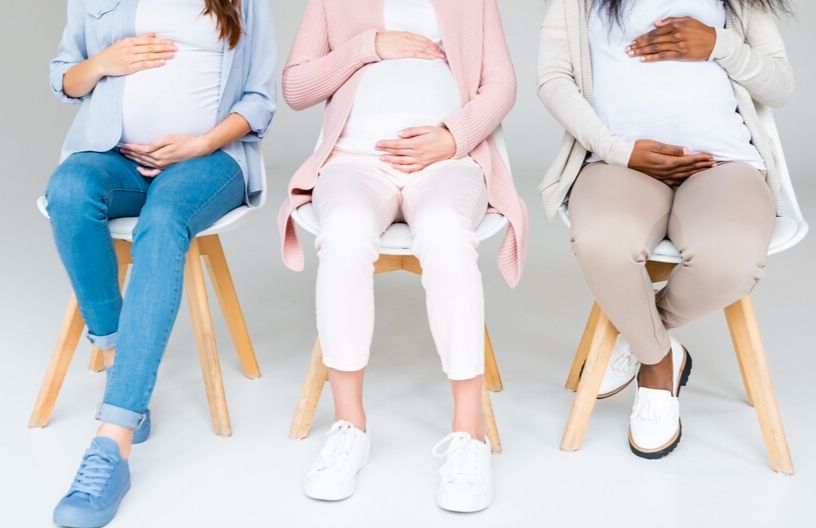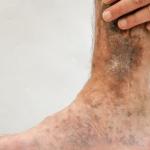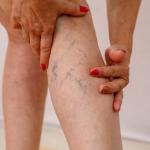
Does Pregnancy Cause Varicose Veins?
During pregnancy, your blood volume increases while the rate of blood flow in your pelvis decreases. This process places immense pressure on your veins, which can eventually cause them to expand. Varicosities during pregnancy most commonly occur in the legs, ankles, and feet.
Pregnancy is not the only factor that increases your risk of developing varicose veins. Age, lifestyle, and genetics can also play roles. We suggest talking with your doctor and family about your medical history to determine if you’re more likely to develop varicose veins. If you are, close monitoring by a vein specialist may be beneficial.
If you are wondering how to prevent varicose veins in the legs during pregnancy, fortunately, making simple lifestyle changes can go a long way towards avoiding venous issues.
VARICOSE VEINS: CAUSES, SYMPTOMS, & TREATMENT
Understanding the Link between Pregnancy and Varicose Veins:
During pregnancy, the body undergoes significant hormonal changes to support the growing fetus. Increased levels of progesterone cause blood vessel walls to relax, while the expanding uterus exerts pressure on the veins in the pelvic region. Additionally, higher blood volume puts more strain on the circulatory system, leading to slower blood flow in the legs and feet. All these factors collectively contribute to the development of varicose veins during pregnancy.
Prevention Strategies for Varicose Veins During Pregnancy:
a. Stay Active: Regular low-impact exercises, such as walking or swimming, can help improve blood circulation and reduce the risk of varicose veins.
b. Elevate Your Legs: Elevate your legs whenever possible to reduce pressure on the veins and promote better blood flow.
c. Wear Compression Stockings: Supportive compression stockings can aid blood flow and minimize swelling in the legs.
d. Maintain a Healthy Diet: A balanced diet rich in fiber, vitamins, and minerals can support proper weight gain and circulatory health during pregnancy.
e. Control Weight Gain: Work with your healthcare provider to manage weight gain within healthy limits, which can alleviate pressure on the veins.
f. Stay Hydrated: Drinking plenty of water can prevent constipation and promote overall blood circulation.
While pregnancy can increase the risk of developing varicose veins due to hormonal changes, increased blood volume, and pressure on the veins, there are several preventive measures that expectant mothers can adopt to minimize their risk. Staying active, maintaining a healthy diet, wearing compression stockings, and elevating the legs are just some of the effective strategies to promote better blood circulation and reduce discomfort during pregnancy. By understanding the relationship between pregnancy and varicose veins and taking proactive steps, women can enjoy a smoother and more comfortable journey to motherhood, focusing on the joy and excitement that pregnancy brings.
Treating Varicose Veins During Pregnancy
If you experience venous pain or discomfort in your legs or ankles during pregnancy, we recommend consulting one of our leading vein specialists. They can determine whether you are suffering from vein disease, also known as venous insufficiency. Usually, vein treatment is recommended six months after pregnancy because many changes occur to the body after delivery. Our vein specialists can work with you to help advise the best course of treatment during and after pregnancy.
Vein disease is the underlying cause of varicose veins. This common health condition can lead to dangerous conditions like venous ulcers and blood clots. Fortunately, minimally invasive vein treatment exists that can treat the underlying problem.
Our non-surgical vein treatments have a similar goal. Our specialists aim to seal any diseased veins and reroute blood flow to healthy, surrounding ones. Treatment typically takes about an hour, from start to finish. Performed as an outpatient procedure, most patients can leave immediately afterward and return to normal activities.
What Happens to Varicose Veins After Pregnancy?
After pregnancy, varicose veins may improve for some women, while for others, they might persist or worsen. In the postpartum period, the increased blood volume and hormonal changes that contributed to the development of varicose veins during pregnancy gradually return to normal levels. As a result, some varicose veins may reduce in size and become less noticeable. However, getting a diagnosis to determine any underlining conditions is still recommended.
Additionally, the pressure on the veins from the expanding uterus is relieved after childbirth, which can also alleviate some symptoms associated with varicose veins. However, for women with a family history of varicose veins or those who had severe varicose veins during pregnancy, the veins may not fully regress, and some individuals may even develop new varicose veins after giving birth. Proper postpartum care, including maintaining a healthy lifestyle, wearing compression stockings, and elevating the legs when possible, can aid in managing varicose veins and promoting better circulation during the recovery period. It is essential for women to discuss any concerns about varicose veins with their healthcare provider and receive appropriate guidance for their unique post-pregnancy situation. Our vein specialists at USA Vein Clinics are happy to discuss diagnosis and next steps for treatment before and after pregnancy.
Schedule a Consultation at USA Vein Clinics
At USA Vein Clinics, we provide minimally invasive, outpatient treatment for varicose veins, spider veins, and other venous issues. For personalized recommendations on preventing varicose veins during pregnancy and how best to treat them, just call us at 888.768.3467 or schedule an initial consultation online.





